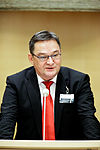
Hans Enoksen is a Greenlandic politician who served as the third Prime Minister of Greenland from 2002 to 2009.
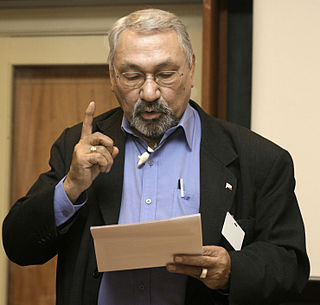
Jonathan Jakob Jørgen Otto Motzfeldt was a Greenlandic priest and politician. He is considered one of the leading figures in the establishment of Greenland Home Rule. Jonathan Motzfeldt was the first and third Prime Minister of Greenland. He was Greenland's prime minister from 1979 until 1991 and again from 1997 until 2002. He is Greenland's longest serving prime minister and has won the most elections of any prime minister of Greenland.

The Prime Minister of Greenland, officially referred to as the Premier, is the head of the Government of Greenland, the autonomous country within the Kingdom of Denmark. The incumbent Prime Minister is Kim Kielsen of the Siumut party. The Prime Minister is usually leader of the majority party in the Parliament of Greenland. Jonathan Motzfeldt became Prime Minister after home rule was granted to Greenland in 1979.
The Democrats is a liberal and unionist political party in Greenland.
General elections were held in Greenland on 2 June 2009. Prime Minister Hans Enoksen announced the election date on 15 April 2009, stating that he would prefer for a newly elected parliament to administer Greenland when the self-government reform takes effect on 21 June 2009. The reform gave more power to the Greenlandic parliament with decisions on most issues being devolved to the parliament but defence and foreign affairs remaining under the control of Denmark.
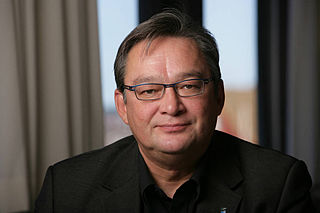
Jakob Edvard Kuupik Kleist is a Greenlandic politician who served as the fifth Prime Minister of Greenland between 2009 and 2013. A member of the Inuit Ataqatigiit party, he was the first Prime Minister not affiliated with Siumut.
The Naalakkersuisut is the government of Greenland, a "constituent country" of the Kingdom of Denmark, takes place in a framework of a parliamentary representative democratic country, whereby the prime minister is the head of government, and of a multi-party system. Executive power is exercised by the government. Legislative power is vested in both the government and parliament Inatsisartut. The judiciary is independent of the executive and the legislature. Greenland has full autonomy on most matters, except on policies and decisions affecting the region including negotiations with the devolved legislatures and the Folketing.
The Labour Party was a short-lived leftist political party in Greenland. The party was founded in early 1979 as the political wing of the Sulinermik Inuussutissarsiuteqartut Kattuffiat (SIK) trade union centre. SIK had previously supported Siumut, but that cooperation had been terminated in the fall of 1978.
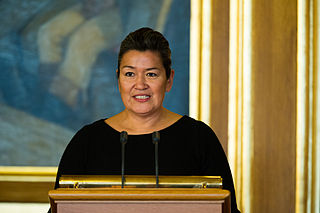
Aleqa Hammond is a Greenlandic politician and member of the Danish Folketing (parliament). Formerly the leader of the Siumut party, she became Greenland's first female Prime Minister after her party emerged as the largest parliamentary faction in the 2013 elections. In 2014 she stepped down as Prime Minister and leader of Siumut, following a case of misuse of public funds. She was expelled from Siumut on 23 August 2016 after yet another case of misuse of public funds and became an independent. On 31 March 2018 she announced that she is running in the 2018 Greenlandic parliamentary election for the Siumut breakaway Nunatta Qitornai.
General elections were held in Greenland on 4 April 1979, the first election to the new Parliament after the introduction of home rule. The result was a victory for the separatist and left wing Siumut, which won 13 of the 21 seats in the Parliament, over the unionist and moderate Atassut. The difference in seats won became relatively large because of the use of first past the post in five constituencies in northern and eastern Greenland, which were all won by Siumut, while the two partes split the 16 seats in the multi member constituencies in Western Greenland evenly. As a result of the election Jonathan Motzfeldt from Siumut became the first head of government in Greenland.
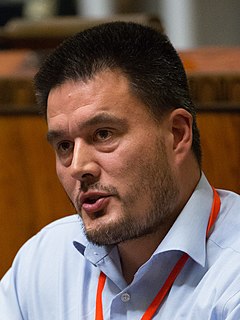
Early general elections were held in Greenland on 28 November 2014. They were called after Prime Minister Aleqa Hammond resigned following a spending scandal. Siumut and Inuit Ataqatigiit emerged as the largest parties both winning 11 of the 31 seats. A three party coalition government was formed consisting of the incumbent Siumut and Solidarity parties alongside the Democrats.

Kim Kielsen is a Greenlandic politician, leader of the Siumut party, and current Premier of Greenland. He was originally a mariner and was a police officer with Rigspolitiet from 1996 to 2003 in Upernavik and Paamiut. Kielsen entered politics in 2005 when he was elected to the Greenlandic parliament for Siumut and to the municipal government of Paamiut. In the government of Aleqa Hammond, he was the minister for housing, nature and the environment. He became acting Premier in October 2014 when Hammond stepped down and the Siumut party subsequently elected Kielsen as its leader, awarding him 44 of 65 votes. On 4 December 2014 his party along with Atassut and Demokraatit formed a new coalition. On 10 December 2014 the new ministers were represented.

Partii Naleraq is a centrist-populist political party in Greenland.
General elections were held in Greenland on 24 April 2018, electing all 31 members of Parliament. The elections were required to be held no later than 26 November 2018, four years after the previous elections on 27 November 2014, but Prime Minister Kim Kielsen chose to call the elections seven months early. His Siumut party remained the largest in Parliament, but lost two seats, whilst Inuit Ataqatigiit, the second-largest party, lost three seats. The smaller Democrats and Partii Naleraq gained seats, with the newly formed Cooperation Party and Nunatta Qitornai parties both entering Parliament.

Nunatta Qitornai is a separatist political party in Greenland advocating for independence. It was founded in September 2017 by former Minister of Business, Labour, Trade and Foreign Affairs Vittus Qujaukitsoq, who had previously been in Siumut and who was subsequently elected in the 2018 Greenlandic parliamentary elections.




